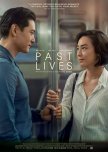
About a great service of love AKA a fateful, karmic relationship
"Past Lives" is a US production. Both the author and the two 'Korean' leads have Korean roots, but they did NOT grow up in Korea, nor do they live there. The story is autobiographically inspired and is dramaturgically presented in authentic dialogues on the one hand and selected, visually impressive sets on the other. It is about the aspect of fate (and or Karma) in encounters as well as pondering platonic love. "Past Lives" is indulging into the emotional world of more or less accountable and sensitive reflection of the protagonists, especially of those two extraordinarily mature, fine young men. You rarely see that. Additionally, as far as camera work was concerned, light and perspectives were chosen with care and thus implemented as supplementary actor, sort of. All this is quite wonderful and has already been widely praised. “Past Lives” is thus a movie well worth seeing.This movie presents South Korea and an attitude towards South Korea through the eyes of a South Korean girl who during the 1990s emigrated with her family at the age of 12. She then grew up in Canada, tried her luck as a playwright in New York, married an American, received the green card as side effect, and is ambitiously seeking recognition and success as a writer today. “Past Loves” thus has its positive emphasis on life in the US. The protagonist´s family had turned their back on South Korea. However, besides everything else, that has been already mentioned all over the place, I would say, that "Past Lives" is actually indirectly, in a rather subtle, reserved, unobtrusive way, (almost overlooked and hidden underneath the shiny, promising dominance of the US,) about positive Korean specific qualities, too... Therefore…
Generally, “Past Lives" juxtaposes those two ´worlds´ rather dichotomously. THERE South Korea, the country of origin that was left behind - far away and rather in the background, in the camouflage colors of the military and surrounded by plenty of soju. HERE the USA - reduced to a highly stylized New York (and artist retreat on Long Island), that is bathing in beautiful light and selected colors. In several respects, the United States is presented as the unrivalled better choice.
However, we experience these worlds through the eyes of the protagonist. In Nora's eyes, South Korea stands for conservative narrow mindedness, constraints, lack of freedom (which to some extend is certainly true). The USA, on the other hand, for her is the symbol for freedom, creative power, partake (should, could, might as well…). Eventually, those world views turn upside down. These are prejudicial concepts, both of which are not generally correct, e.g. each not representing the whole truth.
So, KOREAN normal everyday life is portrayed as conservative, shaped by her parents perspective and Nora's childhood impressions of the 1990s: the young democracy, already economically shaken by the Asian crisis. Her parents were artists and as such one way or another most probably influenced by the shaky turbulences of pro-democracy movement of the 1980s. They wanted a fresh start. Yet, what remains in Nora's memories? Very vague memories of school days, of what was said at home, of the striking images that remain impressively to this day. Bottom line: 'Men have to do their military service.' 'People are conservative and unsophisticated.' 'Men dependently live at their parents´ home until marriage.´ ´You can´t proceed in life.´
On the other hand, NORTH AMERICA is the much-cited world of unimagined possibilities. For Nora specifically, it is about a liberal world for the arts. She´s dreaming about her successful future, while the ambitious daughter may actually be living a much wanted life in lieu of her parents, too, to a certain extent. However, this ambitious dream is symbolically captured as an aesthetically abstract decal of New York and the Montauk artist retreat. For Nora, the USA represent a possibility to fulfil her dream of international prizes as an author. Thus, the USA as the center of her life is uncompromising and practically non-negotiable. That's okay and understandable.
This South Korea in the movie has a strong touch of Nora´s own prejudices. Apparently, she never emotionally processed or reflected her relationship to her country of origin. A deficit, which may also narrow down the perspective of the audience. Therefore, I would like to stand up for positive 'Korean merits', which only shine through subtly. In fact, though, they are formative for the characteristic poetic quality of the story. They come along in the person of Hae Sung. Thanks to him Nora can finally hold the key to her emotional freedom in her hands. (Whatever she may do with it now...) Thanks to Hae Sung (so to speak) she got her story and thus her tremendous success as a writer and director, too.
If you don't identify with Nora´s enthusiasm for the US so much, it might be easier to recognize those ´Korean merits´. Hae Sung actually embodies the opposite of what has settled in Nora's mind about South Korea. He stands for a new spirit among the digitalized young generation - even though he is an engineer. She, however, sees what she wants to see, reducing him to military service, close family ties, his clearly structured career and his reserved answers to her questions about marrying or rather not marrying his girlfriend.
Nora overlooks the fact that in his half-hearted answers about marital responsibility he carefully avoids generalizations so as not to overwhelm her with his feelings for her. She overlooks the fact that Hae Sung is indeed the courageous creator of his own world, possibly facing life even more creatively and openly than she dares herself. He chooses to study abroad in China because he wants to learn the language and because it may suit his career, too. He is ambitiously following his career plans, just like she does. Nevertheless, he is open to life´s challenges and ready to completely turn everything upside down. He is actively dealing with what is going on between the two. He prefers not to go for a logical, reasonable marriage. Instead, he takes what his heart tells him, seriously. He wants to sincerely check it out. This makes him vulnerable, too. Actually it was him, who originally went looking for Nora. With courageous creativity he took the chances life had to offer in his own hands. From a practical point of view, HE thought creatively and acted courageously. Nora on the other hand was the one, who, to a certain extent, simply unwinds her program without looking to the left or right.
Back then, when she left South Korea, she just put her feelings away, came up with a new name, learned the new language and left her best friend (and Korea) behind like an old toy. Since then her feelings for her old homeland only slumber unconsciously in her dreams. In her life, which is highly concentrated on her career as an artist, her past and origins have not been given the place they deserve. Hae Sung has to come first to open the door to that forgotten dungeon of her heart.
Still, we don't know whether Nora was able to take the 'little one' in herself by the healing hand - the 12-year-old Na Young, whom she had left alone in the past. All we know is that Hae Sung gave her a chance to reconcile with her roots and a hidden, almost forgotten part of herself. His great service of love was: not forgetting her, not giving up on her; looking out for her; meeting her, too; recognizing her for who she is; reminding her of something else, that she had almost forgotten; and finally letting her be - in an understanding, loving, respectful, ´Korean´ manner. Even if it hurts.
Actually, being himself, he represented another powerful aspect of South Korea, that Nora had so far not realized as such: A finely nuanced, rather emotionally dominated and yet respectful attitude towards life. This in contrast to a rather dichotomously shaped - black/white, good/bad, yes/no -, rather reasonable approach towards life, as it radiates from her 'North America'-concept.
At the heart of "Past Lives" is the probing of the protagonists' feelings for each other. What are those feelings supposed to be? Platonic maybe? Or more than that? And of course the story lives from the attraction of 'What if?'. This careful scanning of a space of potentiality is processed aesthetically cultivated, and stylishly. Respectfully too. Finally there are tears. ´Past Lives´ it is… However, the striking poetic aspect of this story is only made possible (in my opinion) by this very South Korean Hae Sung, who is not afraid to meet the multilayered complexity of emotional depth, confusing affection and difficult challenges in life, and (!) who is also not afraid to back off in respect to a larger context either. Thus he eventually even provided her on the silver platter of his heart with the so much longed for international artistic success...
PS:
Must be the 'In-yeon' they keep talking about throughout the movie...
--------------------------------------------------------
SIDE NOTE:
In-yeon = a fateful, karmic relationship
--------------------------------------------------------

Ambitious & powerful historical epic done with perfection - right down to the supporting roles
Wow! Historical epic. Visually stunning. Magnificent. What starts out harmless is caught up in the merciless story. Please buckle up. "My Dearest" goes all out. Thrilling! Moving! Intoxicating.The excursion leads into a painful chapter of Joseon's past, its historical cornerstones being emotionally successfully captured in striking scenes. Already after the third episode one may have forgotten the harmlessly rocking swings... back when everything was right with the world. On the other hand, the worst at times brings out the best in people. This may certainly be true for our protagonists, because the more hopeless the circumstances, the more persistent their personal commitment.
A dramatic story. A moving love story. An excellent historical drama. Definitely worth seeing. The time around the Qing invasion on the Joseon Peninsula will remain unforgettable for everyone... and the epic relationship of our protagonists too!
What a couple - in the course of their encounters, Namgoong Min and Ahn Eun-jin develop a strong, charismatic attraction for their ambivalent and baffling, yet complex and nuanced characters. All this is visually perfectly staged. Perfection applies overall to the dramaturgical layout of the intertwined personal and political processes. "My Dearest" offers differentiated, touching character portraits right down to the supporting roles. Powerful!
Unfortunately, after the tenth episode, we're stuck for a while before we continue with the second season... But until then, as far as I am concerned, "My Dearest" has been a complete success!
-----------------------------------------------------------------------
SIDE NOTE --- the Qing invasion 1636 ---
The historical context of “My Dearest” is quite an issue for Joseon history! For the Korean national self-image the impact of the Qing invasion of 1636 can be reckoned even more traumatic, shameful and dramatic than the unparalleled Japanese invasions of the Imjin Wars in 1592 and 1598. This is because Joseon finally had to ignominiously submit to the Qing and eventually remained their vassal state until the First Sino-Japanese War end of the 19th century. (With Imjin Wars, Joseon was actually able to repel their invaders - at that time with the help of the Ming - and thus could preserve the grandeur of sovereignty.) That second Qing invasion in 1636 went down in history as a truly disastrous defeat. Who likes to remember such a 'weak' king and such unspeakably embarrassing humiliation?
Apart from its touching epic love story, "My Dearest" thus also deals with the narrative of the people of Joseon back in the 17th century - their different positions, either pragmatic or idealistic. That time of the invasion is well documented in diaries of contemporary witnesses. Historical scholars to date, however, have discussed the Qing invasions in Joseon mostly from the perspective of the Qing against the Ming and the political power struggles concerning the Chinese empire. In “My Dearest” the Joseon perspective is given its own emotional narrative. And this is characterized by personalities, ideals, value systems, symbolic gestures, as well as those small and large deeds and sacrifices of inconspicuous people who often fall through the cracks of historiography. So "My Dearest" isn't just heartfelt entertainment. To a certain extent, the KDrama has an identity-forming, great mission and takes it very seriously and right into mass consciousness. Its intention is to be suitably great. It offers portraits of the people at that time an how they were processing historically questionable/questioned decisions, too. It brings us close to the dilemma of that time. And greatly so.
-------------------------------------------------------------------------
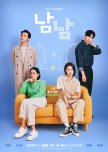
In a unique way affectionately told. Critically nuanced. Not off-the-shelf. Still easy to digest.
I might have easily missed “Not Others”, if I hadn't volunteered to help out with the German subtitling. I'm glad I didn´t miss it, because "Not Others" turned out to be an unorthodox surprise - being unexpectedly substantial and also pleasantly true to life, thus rooted in a rather simple, normal, everyday world. It is the story of a family, above all of a single mother and her daughter, but there are also a few contemporaries who are related by blood or by choice.The story goes on and on as life goes on and we go with it as a matter of course (and gladly so). (Well, at least that's how it was for me.) There was nothing particularly extraordinary and exciting about it. Just normal madness.
Well, admittedly, a bit more than normal madness... after all, the mother herself is still a teenager when she has her child and doesn't want to give up on some of the youthful pleasures in life - regardless of responsibility for the child. However, the script and the two leads find a good pitch for this very special, unusual and inherently difficult relationship dynamic with all its challenges. A clearly structured 'I'm the grown up and you're the little one' doesn´t exist. It is rather upside down here. Instead of the classic authoritarian hierarchy between parent and child, they both ended up bonding as allies sort of, in a world from which they have fallen. Due to the unusual role constellations, the arguments between mother and daughter often have a slightly funny touch. Behind this, however, lurks a rather unconscious overburdening on both sides. And this earnest approach of this emotionally tricky situation shines through again and again in the strategy of both of them trying to cope with everyday life. However, mother and daughter are overall impressing with their casual authenticity as well as pleasant directness and openness - a communication style that clearly sets them apart from so many others in the story. Choi Soo-young shines here, but especially Jeon Hye-jin, who can show herself from a completely different side in the role of the still youthful mother...).
At some point it's about a criminal case - eventually almost symbolic for the unwanted and eventually professionalized role of the daughter within the mother-daughter-relationship: the need to/the urge to look after her mother. And at some point it's also about romantic love - symbolic for the very human longing to rely on a partner on eye level, to lean on a shoulder... This human need actually concerns mother and grown-up daughter alike. But can there even be a place for 'outsiders' within the mother-daughter relationship?
Please don't take "Not Others" as a crime thriller or even as a RomCom. (The men in particular come along rather secondary...) Ultimately, it is the complicated emotional behavior patterns that characterize the family life of mother and daughter in the context of their very close and extraordinary relationship. This makes the KDrama breathe in and breathe out in its very unique pacing. It is primarily about this uncommon family, with an affectionate, yet critically nuanced look at their very special relationship dynamics. "Not Others" is cautiously questioning established (conservative) family models, too...
Overall, “Not Others” is no off-the-shelf KDrama (like so many others in 2023...).
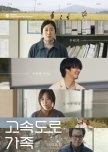
Thought-provoking KMovie, sailing close to the wind when it comes to duty of care and child welfare
The KMovie "Highway Family" is set at the bottom of the social pyramid in South Korea in the year 2022. It portrays a homeless family who seems to have found their own lifestyle at the country's highway rest stops. A happy family sleeping in a tent, living on scrounged money and having lots of fun together.That's one side of the medal. As audience, however, one cannot help but see the other side of the coin despite all the family idyll. The heavily pregnant wife has no medical support during what is now her third pregnancy. Her two children, being five and nine years old by now, miss out on any schooling. The parents claim that they do the teaching themselves, but reading, writing and maths are obviously not on their curriculum. A playground on the highway rest stops, which are heavily frequented by cars and heavy trucks, is dangerous, and the parents' duty of supervision is by no means guaranteed. The father is (as so often) the head of the family and objectively speaking, his decisions about the self-chosen outlaw family life sometimes border on violating his duty of care. Supposed (motorway rest stop) idyll and freedom may correspond to the father and his outlook on life. Wife and children, on the other hand, are now stuck in this boat. They love each other as a family and especially the children know no different. They rely on their father.
The KMovie sails close to the wind when it comes to moral issues concerning work, economy and society as well as duty of care and child welfare. Camps may form in the audience. And that is intentional.
The second protagonist, alongside the Highway family, is a married couple who lost their own child and who run a second-hand furniture store. Solid. Prosocial. Responsible. However, emotionally deeply wounded and unhappy.
Worlds clash. Two families meet. One is shattered deep inside, the other formally. Together they build something new - an alternative family patchwork, grounded in a rather simple normal life, which obviously doesn't have to be the worst, at least when kids are involved. Yet, can it be as simple as that? And at the disturbing end there is the question about the end of the story... which remains in the eyes of the beholder...
A thought-provoking KMovie.
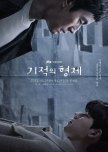
Powerful plot. Solid & unique. Four-dimensional. An enrichment on the KDrama crime thriller market
A solid thriller, laid out across time and space. The fourth dimension has a hand in the investigation. There's a bit of magic involved too.You can expect an suspenseful, opaque story with edgy characters - in particular a cheeky, blustering, stroppy anti-hero as male protagonist. As a writer he is ambitious but probably rather untalented. However, he is also someone who doesn't easily give in and doesn't like to be fooled. And there is this delicate, gifted, mysterious stranger crossing his path…
The criminal act and the perpetrator as such may seem rather familiar, sort of. But pretty much everything knitted around this crime is off the beaten track! With strong characters and powerful plot. An enrichment on the KDrama crime thriller market! With time and space becoming relative...

Not world-shaking at all, though it can be quite witty at times
It's about a vampire who wants to become human. However, fans of vampire stories alert! "Heartbeat" is at best Vampire-'light'. First and foremost, this is ´Rom´ with double ´Com´. It is casual entertainment, its topping made of tried and tested patterns, and clichés, too.Essentially, "Heartbeat" thrives on the special relationship dynamics between the two protagonists, with a rather intractable young woman crashing into an old vampire, who has been robbed of his supernatural powers/resources and who, due to a mishap, is now neither really vampire nor human. The humor and charm of the story lies in this somewhat awkward constellation. Determined female protagonist meets bewildered, somehow lost within identities male protagonist. The whole story is embedded in a stylish, handsome ambience as well as this and that (four-dimensionally knitted) subplot. Romantic vibes are guaranteed and on top of that a bit of suspense, too.
"Heartbeat" isn't world-shaking at all, though it can be quite witty at times. It's fun when you're in the mood for it. With a down-to-earth female protagonist whose everyday life (for a pleasing change) is not predominantly structured by wardrobe and make-up.
Here and there, however, production obviously chose the striking to the logical: No money but the large property always in festive lighting? The protagonist's gothic chambers always bathed in the candlelight of countless candles, regardless of whether he is there or not? (And who would be in charge of this? He never has to light it up, nor blow it out when he leaves... they are always burning.) Well. Ok, let´s not nit-pick…
"Heartbeat" obviously doesn't take itself too seriously when it comes to such details. If you can overlook this and that, then it´s fun@work... as fun and light entertainment are clearly the goal. So, don´t expect more than that.
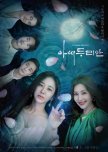
RomCom, crime, historical drama, fantasy & Makjang make the dough for something standalone new
"Durian's Affair" is set among the wealthy - ´here´ (2023) and likewise ´there´ (long gone Joseon days). The time may have changed for Du Ri-an and her daughter-in-law, but the place has not. They are instantly catapulted from their Joseon days to recent today. Some of the wealthy family, who own the property today, have apparently reincarnated again in this family. They are especially well known to Du Ri-an. Now those involuntary time travelling ladies have to deal with the culture shock and the traumatic leap in time that actually seems as incredible as a dream, whereas in their own days they were actually in the midst of grieving over the loss of their beloved son/husband...This bizarre, four-dimensional dramaturgical setting is providing a load of finely knitted entanglements and arising questions, yet unanswered. What had really happened back then? What's going on today in this family? Why the time jump? So what's next for the two Joseon-day ladies? How is everyone going to deal with this weird practical (and for some even emotional confusing) situation?
This production is full of zeitgeist of the 2020s, in which Anglicisms and Banmal (informal speech) are a matter of course, while in mass consciousness the curtain between different times and spaces has become extremely permeable. Yet, the icing on the cake: relationship dynamics in the fourth dimension. The people of that long gone time are not those of today. And yet... There are notions of their life back then, even if they cannot consciously remember it, as well as the option of making new decisions in their life today. Broken hearts, cupid's arrow, greed and passion, as well as a sense of responsibility or noblesse oblige... it's all mixed up through the perspective of the time-travelling ladies of days gone by. Situation comedy breaks through encrusted structures. The strangely insane is tossing and turning the minds of reincarnates and time travellers alike. Likewise, the strangely familiar is, too.
"Durian's Affair" is one of those KDramas that wants to break with established genres. The South Korean, but also the international market is currently being flooded with excessive KDrama productions. Thus there is increasingly space opening up for experiments... and that's what “Durian´s Affair” is, too. This KDrama is no RomCom, no crime thriller, no historical drama, no fantasy and also no classical Makjang. However, elements of each are richly included. Together they create something independently new. Anyone who is open to such an experiment should sit back, relax, shake off the usual expectations and get involved with the KDrama. It's entertaining. With some open questions that keep the suspension throughout all 16 episodes. There are also love interests. (Yes, plural.) All multi-layeredly entangled across time and space. Additionally, “Durian´s Affair” is even exuding a pleasant scent of humanness.
Be prepared for deliberate Sostenuto! The pacing is characteristic, since the production sticks consistently with the two outdated ladies from Joseon days. And in my opinion, those ladies are the ones who make the show as remarkable as it is. Regarding Du Ri-an and her daughter-in-law, all characters in the show as well as the audience alike can work themselves off. Nice!
----------------------------------------------------------------------------
SIDENOTE: --- A reckoning with the lost virtues of a conservative South Korean society ---
“Wheresoever you go, go with all your heart.” -Confucius
In my opinion, "Durian's Affair" is kind of a reckoning with pseudo-virtues of a conservative South Korean society. Du Ri-an and her daughter-in-law are catapulted into Seoul 2023 and show the elite clan around the Dan family what true Confucian virtue actually means. At the same time, they are caricatures as those virtues come along as an almost unattainable ideal. The two ladies from back then embody i.e. propriety, righteousness, integrity, benevolence, wisdom and trustworthiness in such an uncompromisingly consistent way that one cannot help but be amazed. Confucian virtues are inextricably linked to patriarchy. But the lesson in this idealistic self-image of a dignified, respectful life is given to us by two women! Adaptably creative, intuitive, respectful and well grounded. Timelessly human, righteous, wise and trustworthy.
Du Ri-an and her daughter-in-law embody the Confucian virtues, but more than that, they have transcended them without realizing it and found an answer for what these (and every other virtue, too,) are actually intended for: A source of self-confidence as a human being and dignity, from which a person can draw strength and grounding - even in the most adverse situations! In general, this as a prerequisite for any human, compassionate, authentic encounters. Those virtues had to be (necessarily, involuntarily) adapted by those ladies into a completely foreign century. (And they prove themselves again and again in every one of the three different households of the Dan family.) So it is actually about the core essence of any virtue: providing a human being with dignity and inner values as a compass – reaching out with the power of respect and thus transcending boundaries of specified classes, too.
The two time travelers come across as idealized caricatures of the bygone Joseon period, that is generally considered virtuous. As foreign ladies in Seoul 2023, they embody rather unreal, almost exaggerated ideals of virtues that are still upheld and (as it turns out) actually largely lost. And yet, the two ladies prove it: true, authentic dignity can grow from the upright embodiment of these virtues. This dignity matches its dramaturgical equivalent in the overall deliberate Sostenuto pacing of the K-drama.
The timelessness of the old values stands in apparent contrast to the growing western internationalized coolness and the elitist arrogant version of the new nobility, which however seems to have lost any grounding unless it is for money. It is rather obvious: a bit more humanness, morality, integrity, wisdom and trustworthiness would be nice here and there. What is offered above all is a shiny facade cushioned by the bank account. More or less covered underneath you find any human topic irrespective of class or wealth: longing to be loved, self-doubt, jealousy, gender issues, fear of aging, love in old age, temptation...
In "Durian's Affair" the head of the family clan may be a (actually surprisingly liberal) woman. Homosexual love can become a topic here, too. And then there are a few more time-sensitive issues in play. Yet, authenticity and sincerity are primarily triggered by the two noble, upstanding Joseon ladies... They may remind one or the other just by their attitude towards life, that human dignity is deeply rooted inside - even though one may have lost or forgotten about it along the way.
Don’t get me wrong. I'm not standing here for Confucian virtues. And neither does the KDrama. But it holds a nicely presented mirror to South Korean society, which to this day may hide behind the 'old, time-honoured' values. For better or for worse. If so, then it might be crucial to fill these virtues with life. Message: The present is far from that. Fascination? Yes. Attraction? Perhaps. But embodied? No. Two ladies from the past must be landing in 2023. (And actually they had to carry their baggage at home back then - a baggage whose weight was characterized by a questionable virtue (also) of the people of that distant time.)
“Durian´s Affair” rejects any kind of idealization. How nice, indeed! Yet it upholds authenticity (as a new and needed virtue?), basic for any respectful human-to-human encounter. As a value! As the true virtue! And with that - against this background - "Durian's Affair" becomes quite a progressive KDrama production. What a delightful surprise!
PS:
And then, the ending. It is open for all you can imagine. Any direction. You choose, where to go next. Drama just like the human condition (la condition humaine.) Like the wheel of existence, fueled by Karma! It goes on and on... A never ending story of birth and rebirth...
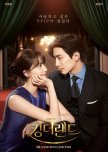
Maybe being so focused on success, King-The-Land almost lost track of the core of a KDrama´s heart
As far as I am concerned, "King the Land" triggers extremely ambivalent feelings. I'm still undecided whether to classify this KDrama as a Trojan horse or as a successful prototype AI product. In other words: is it deliberately engineered brainwashing (that at times comes very close to even insulting the human intellect), or is it the result of an AI (programmed for max audience share) as showrunner in its first, but surprisingly successful test run?"King the Land" is a Rom+Com. A fairy tale we have known and loved for generations. The unthinkable becomes possible: the hard-working girl next door finds Knight in Shining Armor - a Jaebeol offspring who can afford the luxury of not even being interested in the rich heritage of the conglomerate. Well, if you feel like something like that, you get a highly polished version of a cheerful, trivial (and conservative) love story that opens up clichéd insights into the upper segment of the shamelessly high-end luxury world.
Here my criticism. My irritation. Even annoyances.
--> These days, we can (and obviously have to) get used to product placement. That´s nothing new. However, "King the Land" undauntedly puts an almost obscene shovel on top of that. It goes so far that at times I felt like I was stranded in a 16-episode commercial, which I consider quite intrusive. Shameless. Apparently it can always be worse.
I rarely fast forward. But rarely have I fast-forwarded as much as in "King the Land". Usually, I'm ready to get involved in moments - looks, gestures, stand still, in my opinion all of that can be part of the dramaturgy. But here the long takes far too often serve a product placement or a Lifestyle-Statement being deliberately staged on the occasion, or some triviality that may or may not be considered nice, yet without any impact for the story. Just for fun, so to speak, because it is (supposedly?) so pretty. Most of the time it's about a haunting, almost mean display of a lifestyle in the highest-priced luxury segment, which will probably never play a role for the vast majority of the audience. Then I get angry. Not because the story is set in an exclusive social class, but because it is staged in such an oversized manner, while giving it a lot more screentime than would be necessary or coherent for the feeling and understanding of the story.
My understanding goes like this: The high-gloss, stylized luxury lifestyle of the absolutist elite hides a message between the lines that is addressed to all classes below: “”” You'll never get there! Forget it. Enjoy what you have. Make an effort, then it could even be a little more. Yet, be aware: WE play in another galaxy, light years away from you. Give up. Surrender. Let us do it all. Then it shall not be to your harm.”””
---> Additionally: The KDrama chooses a nasty mixture of proven dramaturgical elements and links them with another hidden, questionable message that might be hardly noticeable, yet effective.
There is the world of the employed, that so many people in the country (and elsewhere in other countries) share. In particular in South Korea this is often enough about an authoritarian hierarchy within a corporate structure. This includes almost as a matter of course: bossing around, exploiting, abusing, and some more exploiting. This goes through all instances. It is nothing new. This is everyday life for many.
Thus, a rebellious protest is always welcome in KDrama. “King the Land” also grabs into this box - courageously and with some humor as the hero immediately counters the frustration that nothing ever changes. He rebels. Dares to speak back. Pushes through, with vigorous means when necessary. And keeps the upper hand. How wonderful! … It's just too bad that he happens to be the chairman's son and can afford to do that... Here, and there, and almost everywhere...
So, the positive, rebellious (democratically inspired?) message turns into the (autocratic) opposite: “””Only those who swing the scepter of (monetary) power can change something, because they are the ones, who actually have something to say. The ones at the top. An this is, because they are at the top for a good reason, because they have the background, the stamina and the right genes to de facto be responsible for the rest.”””
“King the Land” never tires of throwing this message into the audience's eyes and ears - in all its possible epic breadth. In particular, embodied by the protagonist's stepsister and antagonist, but even by the protagonist's trusted secretary. Sure, our hero ticks differently, but (this is the harmless insight to take home with us): “””It's not the evil chairmen, but there is an economic reality with which all people who think and act halfway responsibly have to put up with. Period! These are given contexts that one cannot escape from when in such a responsible position. Ergo: THOSE up there are no worse than we down here. On the contrary: THOSE up there bear responsibility, we down there don't. And THOSE up there actually mean well with us. We can actually be happy: we are doing well after all...”””
Yes, it may be true, that many are better off than others, that they lead a more comfortable life than their parents or grandparents did. Nevertheless, I feel this message (that so often resonates in this KDrama) as one that basically wants to keep people little and hold their potential down. I personally don't like that.
Therefore: Is “King the Land” trotting along as a Trojan horse of the autocratic backroom masterminds, selling their notion for a modern absolutistic society?
Or - with a wink:-) - another assumption: Is "King the Land" an AI product? An AI, which with all its algorithms, its heuristic search for solutions and its logical conclusions, yet blind for socio-political nuances, reaches into the colorful pot of success guaranteed dramaturgical determinants, inflates those for even more success and breathes life into it with popular (success-guaranteeing?) mimes, music and light. However, one can sometimes get the impression that the heartbeat is missing. Its rather forced here and there. (Some even reproach the KDrama for lacking any cross-cultural sensitivity.)
In my opinion, the 'done with love' of this KDrama bobs back and forth between 'yes' and 'no'. A pretty face has to be enough, a harmonious tune, a touching gesture, a look, a kiss at the right time to make amends for the rest. Towards the end, the KDrama tries hard again, the amorous and yet tricky relationship dynamic emotionally comes to the fore a little more (e.g. as a relationship that isn't appropriate for the Heir), and some processes come across quite promising, to the extent that maybe something actually might possibly change about the cemented corporate culture of King Group. Nevertheless, being embedded within the absolutist brainwashing of the overall scenario, it loses some of its charm. (For me) A bland taste remains.
--> However, the good news at last:
I cannot say I totally wasted my time. If in between I was able to ignore all of the above-mentioned allegation (which was actually possible!), then the KDrama also delivered: a nice, clichéd love story in the Jaebeol milieu, with some cat-and-mouse games, without much depth, but with extra (!) cream. Simple as that. (By the way, some are already treating "King the Land" as the KDrama with the best kissing scene...)
--> Conclusion:
Maybe being so focused on success , “King of the Land” almost lost track of the core of a KDrama´s heart. However, at least a few within the production team obviously tried to put quite some effort into emotional finetuning, too.
So, I'm ambivalent. In spite even the unabashed style I criticized, I watched to the end. Not only out of professional curiosity. Despite all the indignation that inevitably spread through me again and again, at times I eventually enjoyed it, too. (Otherwise I would have dropped it - and then quite early.)
For all that, that's KDrama, too...
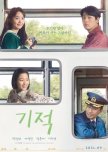
A lovingly told, soulful story based on true events. 117 uplifting minutes that´ll bring you joy
"Miracle: Letters to the President" comes across as a wonderful fairy tale. And yet it isn´t. The story arose from harsh reality. "Miracle" is a soulful KMovie about dreams come true, bathed in the bright colours of the four seasons in a remote, idyllic mountain valley. This landscape is a crucial player in its own, thus impressively contributing to the whole plot. Actually, a handkerchief or two might be helpful, even though the KMovie isn´t particularly playing on our heart strings. It's just a touching story, lovingly told.The setting of this true story: a remote mountain village in the east of the country, that can only be reached via the trass of the railway line. However, it does not have its own train station. For the residents, this means that they have to put up with an arduous walk along the trass in order to get to the next village as quickly as possible. For example, the protagonist spends five hours each day commuting to and from school. And quite a few people have already lost their lives on this dangerous walk over this busy trass through the mountains – including the mother of the protagonist. The boy's dream: a train station for his village. The chances are low, but he does not give up.
It may help that he actually seems to have a special talent for science. Also it may help that in Rah-hee, a bright daughter from an influential family, he finds a school friend and at the same time his muse, always encouraging and inspiring him in her idiosyncratic way. Thus, "Miracle" is also a tender, unusual love story with the charm of the 1980s.
So there are wounds and wonders, as well as wonderfully staged images, yet with a challenging core. All in all, a lovingly told, soulful story based on true events. Nostalgia of the 1980s, picturesque nature and rustic mountain idyll, the slower pace of provincial life and spectacular railway lines through tunnels and over bridges in the steep foothills of the Taebaek Mountains convey "Miracle" its distinctive character. The KMovie is bathed in an all-round positive aura. 117 uplifting minutes that´ll bring you joy.
-------------------------------------------------
SIDE NOTE: --- Yangwon Train Station ---
Socheon-myeon is a mountainous area in North Gyeongsan, in the east of the country.
The Korail Yeongdong Line crosses this area on its way from Yeongju in North Gyeongsang Province via Taebaek Mountain to Gangneung in Gangwon Province. Since 1988, the Yangwon railway station has been the smallest and also the first private railway station in South Korea. Until then, the village was isolated from the rest of the world in the middle of a rugged valley. Even though a railway line had passed the village since 1955, the train had never stopped. There was also no road leading to the village. 3.7 km of railway line separated the villagers from the nearest Seungbu railway station and thus connections to other towns and cities. With ax, shovel, mortar and sweat, the villagers finally built their tiny train station themselves.
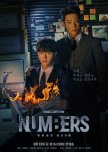
Don't be deterred by a supposedly dry accountants´ world. It´s feisty. Suspenseful. Emotional, too
"Numbers" is about auditors, balance sheets and accountants. It's obviously all about numbers. That may put some people off. It's also about what lies behind those numbers, and that may at times seem even more complicated to the uninitiated. However, deliberately illustrative examples are repeatedly interspersed. And it is even more gratifying that it is not necessary to understand all this in every detail in order to enjoy the series. “Numbers” is about a rational and clever mastermind. Yet it is also about having the heart at the right spot. It´s feisty. It´s also emotional. It stands up and means it. Great!"Numbers" is definitely worth it getting involved in the abstract world of accounting specialists. Especially since their decisions, in turn, have consequences for a world that juggles numbers even more aloof - Investment Fonds... While the auditors keep an eye on the current state of the balance sheet and put its potential through its paces, investors only care about future returns and often want the maximum profit regardless of the losses - which others have to bear for it.
Numbers are numbers. But the decisive factor is who has the sovereignty of interpretation. Numbers sound clean and objective, apparently. Yet, they stand for people, their visions and their decisions. Hidden underneath are solutions, too. As always, the question you´re asking, will make the difference – leading the way for your attention and focus. And as always, different possible perspectives exist. Also in the world of numbers.
"Numbers" is about a revenge campaign – again. There are actually several. It is about those who, with good reason, do not want to be intimidated by the power of the powerful – again. They have nothing (more) to lose. The bad guys are really bad. They have long lost their heart or never had one to begin with. This makes for plenty of interesting relationship dynamics.
"Numbers" also offers an interesting variety of intelligence and competence. Bottom line for revenge candidates – again: just on your own it is almost impossible to make a difference. However, someone courageously has to make a first clever and striking move ahead. With heart and soul. Then maybe others will remember that their heart was once in their right place, too. (In a rational, hierarchical world that takes for granted that there is no room for irrational emotions or personal interests, it's easy to forget just that.)
"Numbers" is a bold story about rather impure moves in the world of accounting and investment. A complex story. At the same time, an exciting, thrilling story that is fun, too. No matter how remote this world of dizzyingly high numbers may be for most of the audience, watching the story feels good overall. You get a high-flying, intelligent mixture. The actors show a strong presence in their roles and thus contribute a lot. The pace is right. OST fits fine.
My suggestion: don't be put off by suits, ties and a supposedly dry, conservative, number-dominated accountant business world. Sure enough, "Numbers" has it all!
------------------------------------------------------------------------
Side Note:
Banks in South Korea have been taboo for investors since the Asian crisis. For the bank sector, on the other hand, financial investment transactions are not permitted. Just now, in 2023, fundamental reforms were launched - some are even talking about a revolution. The banking sector is just now being opened up to new players in order to stimulate competition.

If you´re ready for what lies beyond the obvious & don´t mind a gloomy scenario, go for it
For those who don't blench from paranormal dimensions, "Revenant" is certainly a must-see KDrama. Pretty much everything is done right here. "Revenant" is a crime thriller that transcends time and space, embracing a world that is more than meets the eye and the rational mind. “Revenant” also belongs to the genre of supernatural, even horror-mystery productions. However, to reduce it to that would not do justice to this KDrama.Demons, ghosts of the deceased, people who can see such entities, and people possessed by these entities are all traditionally deeply rooted in South Korean culture. Folk religion and shamanism are still present today – sometimes more, sometimes less, sometimes not at all relevant to the individual, yet nevertheless present. "Revenant" is deeply rooted within this national culture, with Shamanistic rituals being explicitly involved here. In the mass consciousness, the supernatural world has retained a firm place over the millennia. "Revenant" specifically refers to that, (unfortunately without going into detail regarding its backgrounds.) In that sense, "Revenant" is not an unusual SBS-KDrama production for the South Korean audience. At the same time via Disney+ Streaming-Platform this series is exporting a piece of its rich national culture across the border, too - superficial as it as such may remain.
In "Revenant" Kim Tae-ri and Oh Jung-se, however, show high-end performance. Actually overall, this KDrama is in general characterized by its great casting. The acting alone makes it worth seeing. The story is unpredictable and complex, so are the relationships. Additionally, it draws from the long tradition of South Korean folk beliefs, ingeniously mixing it with a modern, rather scientific, investigative approach.
Be prepared for a suspenseful plot. The attraction of "Revenant" lies in the dramaturgically intelligent and fascinatingly presented interweaving of crime thriller and multidimensionality of being. It is obscure, too. In “Revenant” people are possessed by ghosts of the deceased, who are acting in an almost criminal manner. With conventional police investigation, murder executed by such astral beings, who materialize their intentions through their mental occupation of human bodies, are difficult to uncover.
Should you watch it? If your are ready for what lies beyond the obvious, yes. If you don´t mind a gloomy scenario, yes. It is different from your ordinary KDrama, though.
PS:
For me, however, "Revenant" is not just another highlight in a KDrama tradition that is rather fearless regarding the paranormal. The production is also one of a noticeable number of KDramas, that transcend time and space as well as this world and the afterlife, which are increasingly flooding the screens. (Especially in 2023 with i.e. "Island", "My Perfect Stranger", "See you in my 19th Life", "Heartbeat", "Durian's Affair", "Miraculous Brother" … and the year is not over yet). Ghosts, demons, reincarnations, time travel, you name it – the worlds overlap and mix, with time and space having become relative. The curtains between different dimensions are increasingly lifted. The paranormal is becoming more and more normal in the worldwide mass consciousness. Multidimensionality is a topic that people obviously increasingly like to deal with. It isn´t necessarily horrifying anymore. Not in South Korea, nor elsewhere on this planet.
In general, I find that quite inspiring, since dealing with multidimensional spaces, times and beings, has a potential to opening up new perspectives towards life. (Even if it may not all be logically satisfying yet.) It is offering a potential towards a more conscious appreciation of what makes us being human, too.
PPS:
One appealing, even salutary message that "Revenant" (somewhere along the line) would have to offer: the 'evil' intentions of the astral beings can only be as evil as the human 'hosts' allow. At some point the human has to give his or her 'Ok'. If a person has no resentment or greed and is at peace with the world, then there is not much harm wandering ghosts or astral beings in the near-earth realms can do. That would be good news, wouldn´t it... yet… compared to ghosts, eventually human beings can easily be the more frightening creatures here...

The KMovie is carefree, harmless and heartily. However, it is not trivial.
"Dream" is about team spirit as a positive force that allows a group to excel itself. The KMovie is carefree, harmless and heartily. However, it is not trivial, as it sides with those commonly referred to in society as the weak.You shouldn't expect too much, then everything works quite well. Obviously, IU and Park So-joon are the show's carthorses. But that doesn't do justice to the rest of the cast, who all contribute their unique esprit. “Dream” comes across as teamwork through and through.
Although it was filmed at original locations in Budapest, somehow, in my opinion, the casting (unfortunately) often enough doesn't work so well, when Korean productions are dependent on actors from different origin. For whatever reason. Even if it's only supporting roles or extras in this case, they seem to be rather amateurish. Hm.
All in all: “Dream” is a KMovie for high spirits and light fare. Not intrusive. With a few flaws here and there. However, also with some well-placed, wonderful and valuable messages in passing.
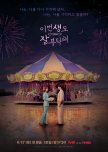
Charming hanger, to tell the same old story about Cupid's arrow in a refreshing crisp new way
"See you in my 19th Life" is first and foremost a love story. However, there is this particular, dramaturgically appealing impulse, since the protagonist has been incarnating on this planet again and again since 980 AND is actually able of recalling all of her 19 multifaceted lives so far quite well. So the protagonist is neither ghost nor demon, but a human being like you and me – only with more knowledge and experience from her previous lives with different gender. She brought all she has ever learned and known along with her.A nice hanger, I think. A great (not necessarily brand new, though,) idea to tell the same old story about Cupid's arrow in a refreshing crisp new way. The idea goes back to a web toon. As tvN-KDrama it comes along in 12 episodes. Here Shin Hye-sun once more took the chance to break down female stereotypes, as she had already successfully stirred up gender-specific behavior patterns with her acting in "Mr Queen". Wonderful.
I think the concept overall works very well. The KDrama presents a Rom+Com in a light-footed pace. However, the protagonists certainly have their bags to carry. So the story doesn't just sail along on the surface. And then, of course, there are also mischievous characters, e.g. in the Jaebeol milieu, adding some extra excitement. In addition, the subplots are quite elaborated in a charming manner, too.
So: If you're in the mood for Rom+Com, you'll be well taken care of with this KDrama. The story draws with pleasure from the large pot of possibilities that arise from the idea of awareness in reincarnation, thus lovingly spicing up a solid love story. Predictable it may still be, yet it is fun, heartwarming and including some surprising twists, too.

Be ready for a comprehensive script and excellent actors everywhere
Spreading its unique, quite appealing, and in places wittily pointed charisma, "Delightfully Deceitful" surprises with a multi-layered crime fiction, that is set in the milieu of people with extraordinary talents and qualities. Even if the poster may suggest otherwise: it is not a romantic comedy. However, "Delightfully Deceitful" does neither shy away from a little comedy here and there, nor from finely nuanced emotions.At the beginning there are the personality portraits and relationship dynamics of a bunch of (because of their distinct peculiarities) 'a-social' contemporaries, who as such being colorfully thrown together eventually form a group of their own. With time, though, the plot of the crime story unfolds, raising once more the question of whether law&order have anything to do with justice; or isn´t vigilantism more promising? In any case, the story revolves around organized crime, unscrupulous villains, malicious fraud and a lot of money.
Nevertheless, there is this bunch of idiosyncratic, unconventional, angular chessmen on the chessboard. Regardless of whether they are psychopathic, sociopathic or hopelessly empathetic, they are all rarely black or white, yet mostly in rich shades of gray. In any case, with their talents they are beyond the social average. While the KDrama could very well surface along at high speed, with a cool and casual esprit, it eventually comes along with a pleasantly profound grounding, since the socio-psychological premise , that we humans are inevitably social beings, swings the baton in the background. The thing is: we want to belong.
Exposure, stigmatization and exclusion also lead to the realization that the rules of the others do not apply to me. This might become associated with some kind of freedom. It also leads to a feeling of loneliness. Yet, the feeling of loneliness inevitably causes humans to slowly but surely wither away. No matter if it may be considered a gift or a burden, stigmatized individuals have to develop a emotional strategy for themselves in order to escape the sometimes more and sometimes less obvious psychological strain. That’s tough for grownups, let alone children...
This premise is handled from different perspectives. Additionally, the KDrama dares the balancing act of mixing this psychodynamic issue with no less complex interwoven crime fiction. Thus, in terms of the genre, the story may initially sail along in foggy realms, but over time the view becomes clearer.
"Delightfully Deceitful" has a well blended mix of spices to offer. Over 16 episodes it is always exciting, intense, opaque, emotional, also dark, sometimes two-fisted. Additionally: Be ready for a comprehensive script and excellent actors everywhere.
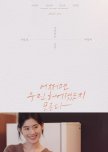
Powerful in its authentic acting & realism combined with dramaturgical abstinence
Does love have an expiry date? Or is it we humans who persistently fail to create a living co-creation from the promising 'WE' for which Cupid's arrow once set the course? "Maybe we Broke Up" doesn't have an answer to that. But! In impressive dramaturgical abstinence, the KMovie encourages us to think about it."Maybe we Broke Up" is also known as "Someone you loved". It documents in fantastic realism the unspectacular 'ending' of a relationship – like so many others. Almost as if couples in crisis could have applied to a reality show, whereas the camera team followed one of them through this difficult time and also for several months beyond. Everything seems real and lifelike and familiar. At the same time dramaturgically abstinent with neither comedy nor jokes through embarrassment, nor suspense, nor eroticism, nor violence, nor action being staged to get tempers boiling.
The couple's relationship story takes its inexorable course. And the problem with this relationship is that it has lost all its appeal. Habit, everyday familiarity, and being taken for granted have taken the place of tingling love. Concepts, expectations and relationship dynamics, which are now well trained from behavioural patterns, keep the radius of emotional highs and lows in check. The KMovie is consistent in this respect and doesn't try to sugarcoat anything. The camera just stays on and the viewers stay tuned to the action. We don't get emotionally involved, we just watch. Maybe we take a stand for one or the other. But that's our business.
The film doesn't want to push us into any corner. It just wants to take us along. Documenting. And it doesn't actually tell us anything new: A relationship gets more and more out of balance. Actually speaking out about the situation eventually brings it all down. There is no turning back. The 'WE' has become two individuals again, who now have to sweep up their emotional shards themselves and thus get the chance to learn the best from their mistakes.
The power of "Maybe we Broke Up" lies in the authentic acting combined with dramaturgical abstinence. The author is also the director. He stays true to his idea. There is no evaluation. And it is precisely through this simple authenticity that the realistic story spirals so poignantly into the mind, leaving the audience with their own record - their thoughts, emotions, questions and well-known stories, be it their own and/or those of friends and/or relatives.
--------------------------------------------------------------------------------------------
Side note: ---- Gosi Civil Service Exam in South Korea ----
The civil service career has been a priority in Korea for centuries. It stands for social recognition, but even more for financial security, up to retirement. Since the 14th century, candidates for civil service have had to pass a state examination. There are nine levels of officials. For the lowest ninth level, all you need today is a high school diploma. The competition is massive. The ninth "Geup" is for those, who get accepted, the start. With years of service and performance, or a degree, the civil servants can then advance to the middle civil service career. But for a higher career up from the fifth "Geup" you have to take the "Gosi" admission test, which only takes place once a year. It is quite demanding, but can be repeated indefinitely. Needing several attempts is not uncommon (and the high demands of the exam are always a popular topic, even in KDramas).
The Gosi exam is only the door opener. After that, the training takes place. A degree is also mandatory for the upper Geups, especially law, economics or political science. Since civil servants are/should be the pillars of society, only the most talented citizens are traditionally selected for this. In fact, most of the top five Geup officials hail from one of the three elite SKY universities (Seoul National University, Koryo University, and Yonsei University). An enormous market for tutoring institutes has now grown, not only for the university entrance exams, but also for the Gosi exam. In these, the candidates are intensively prepared. For many, this means nothing other than: study and study even harder, period. For one year. The better the preparation, the better the chances. However, you can get a lot of support for a lot of money.
The Gosi exam wants to separate the wheat from the chaff. For some, money may help, for others, iron will power, diligence and a certain amount of talent/intelligence must suffice. This combined with a supportive social environment, because in that preparatory year (and possibly subsequent preparatory years) there is hardly time for part-time jobs and everyday obligations...
--------------------------------------------------------------------------------------


 9
9 37
37 15
15


















